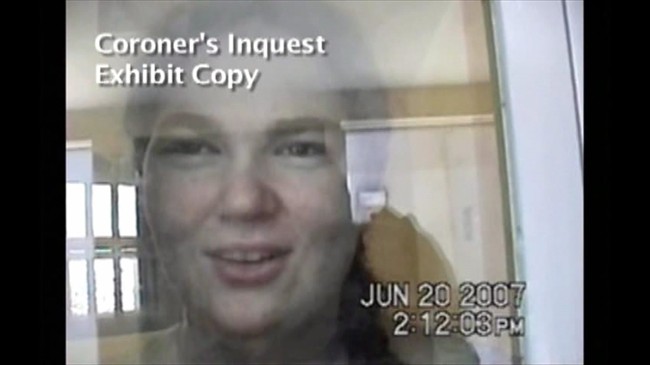OTTAWA – The Correctional Service of Canada is refusing to release records under Access to Information law relating to dead inmate Ashley Smith because it would have a “detrimental effect” on the Ontario coroner’s inquest.

But according to the provincial Office of the Chief Coroner, that’s not true.
“That’s erroneous. That is completely erroneous,” said Cheryl Mahyr, issues manager and freedom of information coordinator at the provincial coroner’s office.
“They’re pointing the finger at the coroner – that is completely ridiculous. They’re just using it as an excuse to grab one of their exemptions and run with it.”
Last month, Global News requested documents relating to instructions for entering Smith’s cell during the final months of her life. The 19-year-old inmate strangled herself to death in a prison cell on Oct. 19, 2007, while prison guards stood outside and watched. Several officers have testified at the inquest that they were acting on instructions not to enter Smith’s cell.
But it’s not known who is ultimately responsible for giving the orders, and Global News hoped to obtain files that would shed light on the details of who ultimately issued the orders and why.
Kim Pate, executive director at the Elizabeth Fry Society who works with female inmates and knew Smith, said it appears the government is trying to prevent the information from being released.
“They obviously know that information,” said Pate. “It sounds like damage control.”
Mahyr said the coroner’s office always makes requests in advance of an inquest asking parties not to release information. But it’s not an order.
“We can ask until the cows come home, and they could tell us, ‘Sorry, if somebody makes a request we’re obligated under the law.’ The Coroner’s Act doesn’t trump federal law,” she said.
In a letter of response to the request, the director of access to information and privacy at the CSC said the prison service is unable to comply with the request at this time.
“We have been informed by the Coroner that release of the records would have a detrimental effect on the Coroner’s inquest,” wrote Ginette Pilon.
The letter goes on to say that “should the information exist” it would qualify for exemption under two sections of the Access to Information Act – to do with investigations and privacy.
“They’re citing sections to deny you access. And they’re pointing the finger at the coroner’s inquest, but….we don’t order anybody,” said Mahyr.
When asked why the government won’t release the information, a CSC spokeswoman wrote in an email that the letter explained the reasons for exemptions in accordance with the Access to Information Act.
A spokeswoman for Public Safety Minister Vic Toews did not respond to a request for comment.
It’s not the first time CSC has resisted releasing information about Smith. Federal lawyers lost a court battle to keep damning videos of Smith’s treatment behind bars under wraps, and also attempted to limit the scope of the inquest. In November 2012, the Harper government ordered Corrections to fully cooperate with the provincial inquest.
The two sections of the Access to Information Act cited in the letter are 16 (1) (c) and 19 (1). The first relates to the conduct of lawful investigations, and the second to personal information under the Privacy Act.
But an official at the Office of the Information Commissioner said the Privacy Act can be overruled if public interest outweighs any harm that results from the disclosure. A spokeswoman for the office said she could not comment on a specific case that has not yet been submitted for review.
Randall Garrison, the NDP public safety critic, said the government has agreed to comply with the inquest but ultimately the issue is not about personal responsibility. He said Toews has yet to ask for a report on the new directives at CSC dealing with mental illness in prison, and for Garrison that is critical to ensuring change in the prison system.
“This is a government that always resists transparency at every turn. That would be totally consistent with what they’ve done before,” he said.
Global News intends to complain to the Information Commissioner within 60 days.



Comments